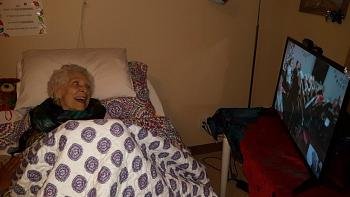Pickering Residents Borrow Internet with a Library Card
Ken Savage was at his wit’s end.
The jazz band his father Jack Savage founded and led until his death last May was staging a memorial concert in Newmarket, and his mother Joyce was in a Pickering nursing home with a broken hip.
“My mother was the band’s biggest fan. She never missed a practice or a performance. But I couldn’t see how I was going to get her to that concert,†Savage said of the Dec. 7 event.
He wondered if there might be some way to connect his 89-year-old mother via Skype and hoped the Pickering Public Library might know how to get Wi-Fi at her bedside.
“I went in, literally, in tears,†said Savage, 58. “And next thing I knew they were telling me that they could do it. I couldn’t believe it.â€
Through an innovative program launched last August, the library’s PPL Connect program offers free Wi-Fi hotspots as part of its digital education and outreach service.
Although the library had never had a request quite like Savage’s, it was certainly within the scope of the project.
Saul Perdomo, the library’s digital project leader, showed Savage how to operate one of 10 hotspots available for loan as well as an iPad tablet for the concert at Alexandra Muir Senior’s Residence in Newmarket.
Several days later on the night of the event, Perdomo went to Orchard Villa Long Term Care home in Pickering with computer equipment to link Joyce to the action so she could enjoy the music and interact with band members, old friends and family.
Although Joyce died Feb. 17, the concert was the high point of a difficult year, Savage said.
“Saul is my hero for making this happen and I am eternally grateful,†he said of Perdomo’s help and willingness after regular working hours to set up the equipment and stay with Joyce until the end of the show.
“Saul’s actions not only allowed Mom to say goodbye to Dad’s companions from the past three decades, but brought together two communities, two seniors’ facilities and my Dad’s two loves: music and my mother,†Savage said.
For Pickering entrepreneur Mark Robertson, who had to take early retirement a year ago after open heart surgery and ongoing medical problems, the program has been “a lifeline.â€
No longer able to afford cell phone or Internet service, he and his wife would sit in their car outside the library and coffee shops to get Wi-Fi and stay connected to family, make doctor’s appointments, access CPP and other government support.
“We felt like we were drowning,†said Robertson, 57. “When you are having to choose between eating or your medication, (paying for) Internet service is just not possible.â€
Robertson learned about the library’s hotspot loan program at a local farmer’s market where Perdomo was demonstrating robotics and other technology available at the library.
“For people who are on the edge, this is amazing,†Robertson said. “To be able to get Wi-Fi in your home is huge. It’s extremely forward thinking.â€
The PPL Connect program is part of Pickering’s commitment to give residents access to reliable and robust broadband services, said the library’s technology services manager Christy Harper, who oversees the initiative.
About 15 per cent of the city’s residents have no home Internet access and the program is aimed at helping them stay connected to their community and personal networks, she said.
The two-year $175,000 program, funded through the Ontario Libraries Capacity Fund for Research and Innovation, allows clients to borrow a hotspot with unlimited data for up to two weeks. Once they return the device, which looks similar to a wireless router, they can put their names on a wait list to borrow it again.
The program has also helped the library purchase 30 Chromebooks and 20 tablets for digital access and education to schools, seniors’ homes, ESL classes and other groups, Harper said.
So far, about 114 clients have borrowed a hotspot and there is usually a wait list of between 10 and 20 people, she said. When the provincial grant runs out in 2018, Harper said she hopes the library will provide permanent funding to cover the hotspots and Perdomo’s salary.
The Kitchener Public Library launched Canada’s first free Wi-Fi hotspot lending program in October, 2015.
The Toronto Public Library began a program last July as a one-year pilot in five low-income communities where residents are able to borrow 195 devices for six months.
The first phase of the Toronto pilot was funded through a $100,000 Google Canada grant and $100,000 from the city’s poverty reduction strategy.
The second phase, which began last month, received $250,000 in permanent funding in the recent city budget which will allow the library to add another 150 hotspots, bringing the total to 350.
The pilot will help the city determine the need and best methods to loan the hotspots, said Pam Ryan the library’s director of service development and innovation.
“We know that
there is much more demand for these devices than we can provide with
current funding,†Ryan said. “We are working with the TPL Foundation to
identify sponsorships and donations to further expand the program.â€
Comments
There are 0 comments on this post





